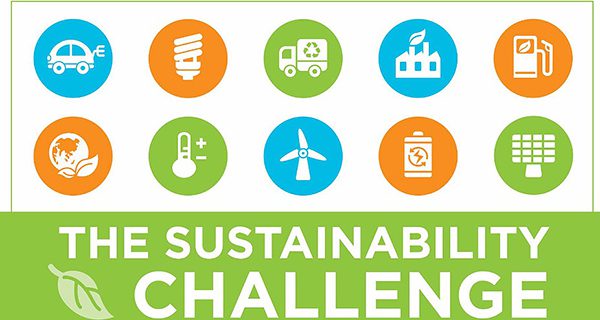By Rama K. Ramaswamy
Wellesley has a unique and longstanding history of environmental conservation. For example, Wellesley is the longest running Tree City USA community in Massachusetts and boasts 26 miles of marked trails interconnecting open spaces and conservation lands. The idea that humans cannot get through a single day without having an impact on the world around them has often been the focal point of discussion by conservationists such as Jane Goodall and members of Wellesley Green Schools (WGS) alike.
"Wellesley has always considered itself to be a leader in many areas - including in education and care for the environment,” explained Jessica Stanton, a longtime WGS member and one of the founders of the Sustainability Challenge. “WEF’s [Wellesley Education Foundation’s] Sustainability Challenge creates a link between the two and provides students with an opportunity for truly creative, out-of-the-box thinking about how and why our town and residents care about the natural world. Students these days are growing up under the cloud of climate change, and that can be fairly scary. This challenge allows them to understand how they can participate in the solution and highlights that small changes in thinking and behavior can add up to some pretty substantial impact and encourages others to be part of the solution, too.”
Sustainability Challenge 2019 is now welcoming submissions by K-12 students who are residents of Wellesley and/or enrolled at Wellesley Public Schools. The Challenge asks students to work on a project promoting a local resource, policy or behavior change that makes Wellesley greener. This can be in the form of an advertisement, op-ed or essay, video commercial, infographic, poem, music, or another form of audio/visual artwork. Students are asked to convince their audience that it’s a great way for them to help the environment. Furthermore, each entry must explain the problem that a current local resource or policy in Wellesley, or a proposed behavioral change, aims to help solve. The entry must provide a convincing argument for the positive impact this resource or activity can make.
The questions to answer in the entry are as follows:
What environmental problems does this organization/resource/behavior change help solve? Provide data or examples of how the environment is negatively impacted by this problem.
What is the positive impact of your topic? How does it help solve the problem? Be as specific and concrete as possible.
What can Wellesley residents do to help or how can they participate? Convince them this resource deserves their support or participation.
Last year, students submitted projects that included green energy, devised ways by which to reduce pollution, recycle, reduce the community’s carbon footprint, and more.
“Whether wind or solar power, this is our time, this is our hour,” said 2017 Sustainability Challenge finalist Noa Lil Helmbrecht.
This year's key organizers for the Sustainability Challenge also include Kelly Caiazzo and Naglaa El-Abbadi.
“The challenges our environment faces can feel pretty grim, whether it’s plastic in our oceans or gas leaks right here in our town,” explained Caiazzo. “It’s important not just to cultivate awareness of the problems, but to highlight potential solutions. We wanted a Sustainability Challenge that would encourage students in Wellesley to learn more about existing environmental practices in town, or about behavior changes people can make. We hope students of all ages in Wellesley will learn the importance of protecting our environment, and also know that many organizations in Wellesley are working towards positive change and could use their help. Whatever students care about most, there are likely organizations right here in town that they could join or work with. As environmentalists, we don’t have to work alone; we’re stronger together! We hope this Sustainability Challenge will inspire students and their families to get involved".
“There are many changes and habits that individuals, families, and the community as a whole can make that together add up to great benefits for the environment,” added El-Abbadi. “Our town is fortunate to have great people and resources dedicated to programs such as transitioning to renewable energy, environmental food programs, diverting organic waste to compost or biofuel, reducing pesticide use, and many others. By highlighting these Sustainable Wellesley initiatives as part of the WEF Sustainability Challenge, we hope to channel the ingenuity of our students to bring these issues into focus in creative and engaging ways, as well as empower them to recognize the positive differences they can make through their own sustainability-oriented behaviors.”
Sustainability Challenge finalists will be recognized and awarded at Wellesley STEM Expo on April 6.
For details and submission guidelines, visit https://www.wellesleyeducationfoundation.org/sustainability-challenge. The deadline for entry is March 15.



















